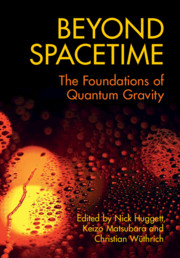Book contents
- Frontmatter
- Contents
- List of Contributors
- 1 Introduction
- Part I Spacetime Emergence
- Part II Time in Quantum Theories of Gravity
- Part III Issues of Interpretation
- 10 Why Black Hole Information Loss Is Paradoxical
- 11 Chronic Incompleteness, Final Theory Claims, and the Lack of Free Parameters in String Theory
- 12 Spacetime and Physical Equivalence
- 13 On the Empirical Consequences of the AdS/CFT Duality
- 14 Extending Lewisian Modal Metaphysics from a Specific Quantum Gravity Perspective
- 15 What Can (Mathematical) Categories Tell Us about Spacetime?
- Index
15 - What Can (Mathematical) Categories Tell Us about Spacetime?
from Part III - Issues of Interpretation
Published online by Cambridge University Press: 24 April 2020
- Frontmatter
- Contents
- List of Contributors
- 1 Introduction
- Part I Spacetime Emergence
- Part II Time in Quantum Theories of Gravity
- Part III Issues of Interpretation
- 10 Why Black Hole Information Loss Is Paradoxical
- 11 Chronic Incompleteness, Final Theory Claims, and the Lack of Free Parameters in String Theory
- 12 Spacetime and Physical Equivalence
- 13 On the Empirical Consequences of the AdS/CFT Duality
- 14 Extending Lewisian Modal Metaphysics from a Specific Quantum Gravity Perspective
- 15 What Can (Mathematical) Categories Tell Us about Spacetime?
- Index
Summary
It is widely believed that in quantum theories of gravity, the classical description of spacetime as a manifold is no longer viable as a fundamental concept. Instead, spacetime emerges as an approximation in appropriate regimes. In order to understand what is required to explain this emergence, it is necessary to have a good understanding of the classical structure of spacetime. I focus on the concept of spacetime as it appears in locally covariant quantum field theory (LCQFT), an axiomatic framework for describing quantum field theories in the presence of gravitational background fields. A key aspect of LCQFT is the way in which it formulates locality and general covariance, using the language of category theory. I argue that the use of category theory gives a precise and explicit statement of how spacetime acts as an organizing principle in a certain systems view of the world. Along the way I indicate how physical theories give rise to categories that act as a kind of model for modal logic, and how the categorical view of spacetime shifts the emphasis away from the manifold structure. The latter point suggests that the view of spacetime as an organizing principle may persist, perhaps in a generalized way, even in a quantum theory of gravity. I mention some new questions, which this shift in emphasis raises.
Keywords
- Type
- Chapter
- Information
- Beyond SpacetimeThe Foundations of Quantum Gravity, pp. 338 - 357Publisher: Cambridge University PressPrint publication year: 2020

